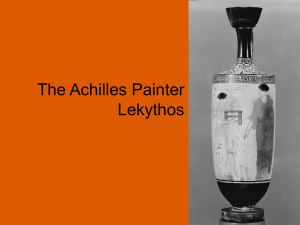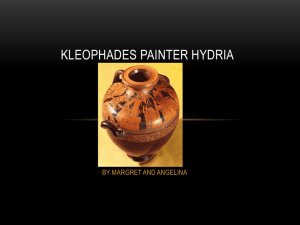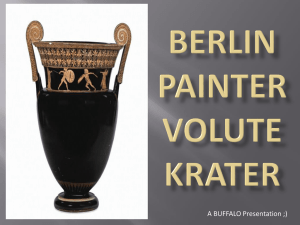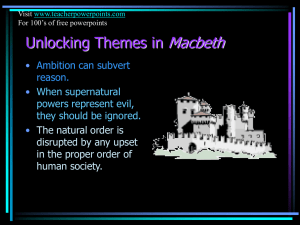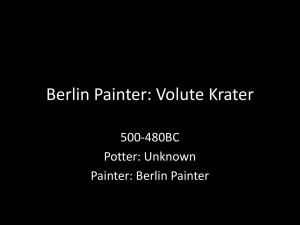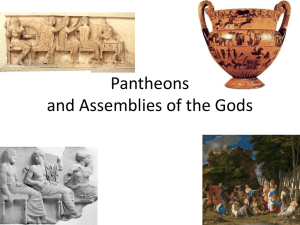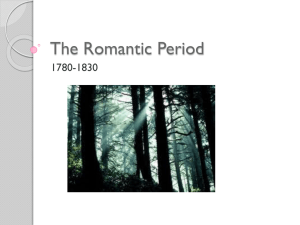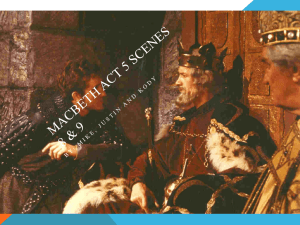Achilles painter Lekythos
advertisement
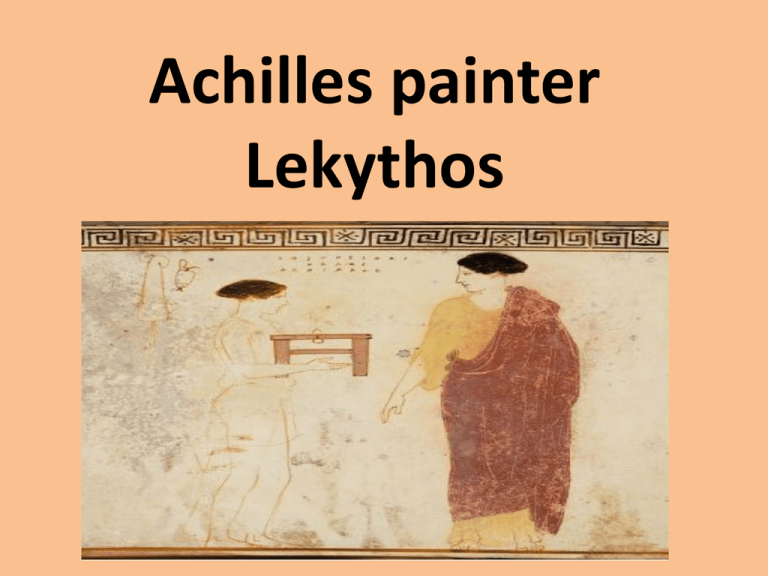
Achilles painter Lekythos NAME: Achilles painter Lekythos MADE: 450-440BC SIZE: 38cm POTTER: not known PAINTER: The Achilles painter WE DON’T KNOW THE ACTUAL PAINTERS NAME, because he never signed his work, he was a student of the Berlin painter, many other white ground techniques are attributed to the Achilles painter. SHAPE VASE SHAPE: Lekythos USE: for funeral settings where oil is stored and perfume WHY IS IT DIFFERENT TO OTHER LEKYTHOS? This Lekythos is unique in terms of its shape, the belly is thinner than other Lekythos WHY IS THIS VASE SHAPE PERFECT FOR ITS USE? This vase shape is perfect for oil because it takes up little space and fills the vases belly INSCRIPTIONS INSCRIPTIONS WHAT TYPE OF INSCRIPTION IS THIS? It is grafitti, a Kalos inscription WHAT DOES IT SAY? Axiophates, the son of Alkimachos, is handsome WHAT IS THE PURPOSE OF THE INSCRIPTION AND HOW DOES IT RELATE TO THE SCENE? It was just a common way of graffiti with no relation to the scene or use. THE SCENE A Non-funerary scene, of a Woman and her Maidservant. Most likely visiting a tomb ??? ON THE SHOLDER: A schematic Palmette pattern TOP OF BELLY: above the scene is the Stopped Meander border. FROM LEFT: Maid servant holding grey painted casket TO RIGHT: Woman directing her servant MAIDSERVANT Located left on the vase, standing in profile Holding a grey casket and offering it to her mistress The servants hair is styled the same way as her mistress. Clothing- Tunic has disappeared, the glazed outline is what is left. It looks like she's wearing a transparent dress. Her face is elegant and calm, reflective of her mistress. WOMAN Located to the right of the vase, stands with feet frontal but looking at the maidservant (foreshortening) Directing her maid with a raised right hand. Hair is curled on top with a few curls on her forehead. She is wearing a Yellow Chiton and reddishbrown Himation over the top. Her face is Calm and elegant, expressionless. PAINTING TECHNIQUE White Ground. A majority of this technique was Used for funerary vases. INFLUENCE: Athenian potters experimenting with natural red clay that turned white when burned and were limited to funerary uses only. Kaolin, the white slip painted over the clay The outline of the figures was painted in honey colored dilute before firing Brighter colors that were used on clothing was added after the firing, therefore it wasn’t very durable hence the disappearance of the servant maids Chiton. COLORS: Mauve, green, pink PAINTING STYLE BORDERS: Stopped Meander(above scene) and Schematic Palmette chain, Tongue pattern EYES: are in profile, looking where their heads are turned. NECK: they have long necks GESTURES: they make few gestures with hands, woman directing maid offering. FACES: are elegant with long noses, faces are sculptured. FIGURES: appear more realistic and slender as a woman should look. INSPIRATION: They appear godlike and removed from the human world, their own kind. FORESHORTENING: feet frontal DRAPERY: is very plain besides the bold colors of the womans clothing, less detailed COMPARISON SHAPE: Similar although the other vase has a handle at the base of the shoulder and the Lekythos doesn’t. The Lekythos also has a thinner shape. INSCRIPTIONS: Similar in a rectangle format above the central scene, also a Kalos- love inscription with no relation to the scene SCENE: Of two woman on one vase, doing different duties. Playing music or serving a mistress. PAINTING TECH: White Ground and red figure. Same borders the stopped Meander and Palmette Chain and Tongue pattern STYLE: Profile, realistic, props in the background bird or Lekythos and mantle on the wall to demonstrate that the scene in the Lekythos is indoors. OTHER DETAILS: These characteristics are how painters are identified by the similarities especially seen in funerary Lekythoi vases.
